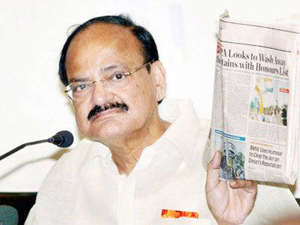Hyderabad, June 22: Attacking the previous government, Union Minister M. Venkaiah Naidu on Sunday said the hike in rail fares was “thrusted upon” by the UPA, but it was a “bitter medicine” that had to be swallowed in the interest of sound health of the economy.
“The hike in fares is thrust upon us by UPA government. It is the result of the misplaced populism of the UPA’s 10-year misrule. The railways are bleeding. Former Railway Minister (Mallikarjuna) Kharge had sought and received approval of the Prime Minister (for hike) ahead of interim budget,” Mr. Naidu told reporters in Hyderabad.
Describing the rail fare hike as a “bitter medicine”, the Union Urban Development and Parliamentary Affairs Minister said the medicine had to be swallowed in the interest of sound health of the economy.
“The railway board has moved now to give effect to what the Railway Minister and then Prime Minister had concurred. It is a bitter medicine which was necessitated to set right the faltering finances of the railways that were aggravated by UPA’s mismanagement of the economy,” he said.
Mr. Naidu explained the sequence of events relating to rail fare hike beginning with a proposal being made on February 6 this year. Photocopies of an official circular dated May 16 regarding revision of passenger fares were distributed to the media.
Noting that only 4,000 out of 12,000 trains announced by successive railway ministers during the last 10 years have been introduced, he said the present railway projects need Rs. 5 lakh crores for implementation.
Alleging that the UPA has “derailed the economy”, the Union Minister said tough decisions have to be taken to put the economy back on track.
Asserting that the Narendra Modi government has the moral courage to take concrete decisions, Mr. Naidu expressed hope that the people would understand the facts.
Referring to the row over using Hindi on social media, he said the government circular to the effect was issued on March 10 this year when UPA was in power.
“Chidambaramji forgets this and says government should be sensitive to the regional feelings. Others also criticise.
The circular talks about promoting Hindi in ‘A’ category (Hindi-speaking) states. This government only sent it down the line. Nobody said do it in Tamil Nadu. What is objectionable in this?” he said.
Mr. Naidu also read out the concerned circular.
The Union Minister said a two-day workshop would be conducted for the newly-elected MPs of BJP on June 28 and 29 at Surajkund in Haryana on parliamentary affairs, the challenges before the nation and BJP’s policies.
Prime Minister Narendra Modi would inaugurate the workshop and veteran BJP leader L.K. Advani would give the valedictory address. Senior leaders like Sushma Swaraj, Arun Jaitley and others would address.
Replying to a query on political appointees, Naidu said, “Congress does not have the right to criticise now because Manmohan Singh government had argued before courts that political appointments should go with politics.”





Comments
Add new comment